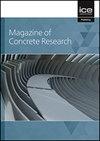用自应力钢筋加固的整体建筑接缝的剪切摩擦能力
IF 1.6
4区 工程技术
Q3 CONSTRUCTION & BUILDING TECHNOLOGY
引用次数: 0
摘要
本研究考察了使用新开发的自应力钢筋(SPRB)加固的整体式混凝土界面的剪切摩擦能力。通过在整体混凝土界面上施加压应力(σx),根据混凝土的不同抗压强度(f′c)制备了 12 个带有 SPRB 的推移试件。为了比较用传统钢筋加固的整体混凝土界面的剪切摩擦能力,制备了四个配套试样。试验结果表明,f′c 和 σx 值较高的试样的剪切开裂和剪切摩擦能力较高,其中 f′c = 40 MPa 和 σx = 0.5fy(其中 fy 为钢筋的屈服强度)的试样的剪切开裂和剪切摩擦能力值最高。试验结果证实,在相似的 (ρvffy+σx)/f′c 条件下,SPRB 需要大于 0.35fy 的 σx 才能达到与使用传统钢筋加固的试样相当的 λn 值,其中 ρvf 为横向配筋率,λn 为剪切摩擦承载力。ACI 318-19 和 AASHTO 预测模型严重低估了剪切摩擦承载力,且精确度较低。特别是,随着 (ρvffy+σx)/f′c 值的增加,实验值和低估值之间的差异变得很大。然而,无论ρvffy 和σx 如何变化,Mattock 模型都很好地估计了本研究中所有测试试样的实测剪切摩擦承载力。因此,测量值与预测值的剪切摩擦能力比的平均值和标准偏差值分别为 1.07 和 0.13。本文章由计算机程序翻译,如有差异,请以英文原文为准。
Shear friction capacity of monolithic construction joints reinforced with self-prestressing reinforcing steel bars
This study examined the shear friction capacity of a monolithic concrete interface reinforced with newly developed self-prestressed reinforcing steel bars (SPRBs). Twelve push-off specimens with SPRBs were prepared according to the different compressive strengths of concrete (f′c) by applying compressive stresses (σx) on a monolithic concrete interface. To compare the shear friction capacities of monolithic concrete interfaces reinforced with conventional reinforcing bars, four companion specimens were prepared. The test results showed that the shear cracking and shear friction capacities were high for specimens with high f′c and σx values, resulting in the highest values for specimens with f′c = 40 MPa and σx = 0.5fy, where fy is the yield strength of the reinforcing steel bar. The test results confirmed that at a similar (ρvffy+σx)/f′c, a σx of more than 0.35fy is required for the SPRBs to achieve a λn value comparable to that of the specimens reinforced with conventional reinforcing bars, where ρvf is the transverse reinforcement ratio and λn is the shear friction capacity. The prediction models ACI 318-19 and AASHTO significantly underestimated the shear friction capacity with low accuracies. In particular, the difference between the experimental and underpredicted values became large as the (ρvffy+σx)/f′c value increased. However, the Mattock's model well-estimated the measured shear friction capacities of all the specimens tested in this study, irrespective of ρvffy and σx. Thus, the mean and standard deviation values of the measured-to-predicted shear friction capacity ratio were 1.07 and 0.13, respectively.
求助全文
通过发布文献求助,成功后即可免费获取论文全文。
去求助
来源期刊

Magazine of Concrete Research
工程技术-材料科学:综合
CiteScore
4.60
自引率
11.10%
发文量
102
审稿时长
5 months
期刊介绍:
For concrete and other cementitious derivatives to be developed further, we need to understand the use of alternative hydraulically active materials used in combination with plain Portland Cement, sustainability and durability issues. Both fundamental and best practice issues need to be addressed.
Magazine of Concrete Research covers every aspect of concrete manufacture and behaviour from performance and evaluation of constituent materials to mix design, testing, durability, structural analysis and composite construction.
 求助内容:
求助内容: 应助结果提醒方式:
应助结果提醒方式:


